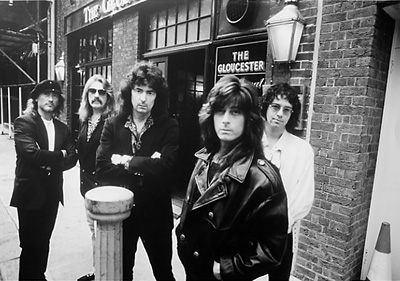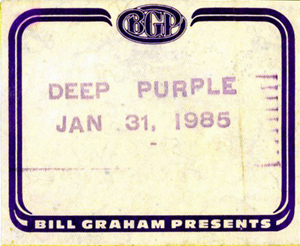
| Search JoyZine with Google Site Search! |
|
Deep Purple by Joy Williams
Formed as Roundabout in 1968, briefly as a front group for former Searchers drummer Chris Curtis, they had some chart success in America, peddling poppy rock covers such as "Hush" and "Kentucky Woman" in the style of Vanilla Fudge. They made three albums, Shades of Deep Purple (1968), Book Of Taliesyn and Deep Purple (both 1969). After their US label Tetragramme went bust, however, the group decided to begin again from scratch, dumping singer Rod Evans and bassist Nicky Simper in 1969 in favor of two ex-Episode 6 men, Ian Gillan and Roger Glover. The new Purple were looking for a heavier sound, with Glover in particular wanting to do something like Led Zeppelin; Jon Lord, though, still had ideas of expressing his classical leanings. They decided to try both approaches, so the first work of the new band was Lord's Concerto For Group & Orchestra (1969), performed at the Royal Albert Hall in London with the London Symphony Orchestra. It sounds appalling—in retrospect—but was well received at the time. Nonetheless, the band, thankfully, dumped the classical pretensions, put in some solid touring and recorded an unalloyed heavy rock album, Deep Purple In Rock (1970). This went Top 5 in the straight off, and stayed in the charts for six months. It opened (as it ended) with a loud crash of electrical abuse, subsiding into a quiet organ piece, before kicking into "Speed King" which threw the words of Little Richard into some punishing heavy rock. It also included "Child in Time," a gentle organ ballad with Gillan's soulful singing building into all-out screaming.
Purple's live shows were characterized by long, improvised pieces in which Blackmore and Lord traded musical ideas—often stolen from blues or the classics (Bach was a particular favorite of Lord's, while "Jingle Bells" often cropped up in Blackmore's solos). Musical ripping wasn't confined to the stage. "Black Night," a #2 hit in November 1970, stole its riff from Ricky Nelson's "Summertime." "Strange Kind of Woman" again went Top 10 in 1971, but albums and touring were Purple's mainstays. Fireball (1971) was notable for "The Mule," with its psychedelic organ track slave-driven by Paice's brutal drumming, but it was Machine Head (1972) that crowned their reputation. It was recorded on a mobile studio in the corridors of a hotel in Switzerland after the planned venue was burned down during a Zappa concert. "Smoke on the Water" told the story: its thumping power-riff was the classic that became a cliché. The 1972 tour of Japan yielded the double live Made In Japan (1973), distinguished by some wonderfully indulgent Blackmore solos, and a Guinness Book of Records credit as the world's loudest band. But the strain (four US tours that year) wore them down, and Who Do We Think We Are? (1973) sounded tired. In 1973 Deep Purple imploded. When the dust settled, only Lord and Blackmore remained in place. In June 1976 Deep Purple finally collapsed. By the early '80s Lord, Paice and Coverdale had ended up in Whitesnake, Glover had joined up with Blackmore in Rainbow, and Gillan had fronted his own quirky but successful band before a Spinal Tap-like stint in Black Sabbath. As Rainbow and Gillan ran out of steam, the pressure for a reunion began to build, and in 1984 the mark 2 lineup of Blackmore, Gillan, Glover, Lord and Paice re-formed. In the event, Lord and Paice were reduced to being sidemen in a stadium-rock outfit: it was essentially Rainbow with Gillan singing.
Purple in the '70s had played blues-based music, tidied up in the studio to make songs. In the '80s the music was straightjacketed into songs without the chance to develop or breathe, although Gillan's humor was intact. But Gillan was sacked for criticizing The House Of Blue Light (1987) and Joe Lynn-Turner was hired as his replacement. We meet early (for us night people) one morning in the record companies' Hollywood office. Though at first we all feel like something the cat had drug in, Roger Glover, Joe Lynn-Turner and I sit over steaming mugs of cappuccino and secretly wonder what we're doing up and about at such an ungodly hour. We start, oddly enough, by talking about Russia— or what was actually still the Soviet Union. ROGER: They had this thing on CNN that says the average Russian works 10 times as hard as the average American, but they don't get anything for their money because everybody's the same, everybody's socialist. So it doesn't matter. Q: But that's going to change now, it has to change with what's happening. ROGER: Just because they get a Pizza Hut, Marxism is not going to collapse. But of course it's changing. The world is changing all the time. Every now and again it changes suddenly. That's when you notice it. Q: It's like that old cliché, "Necessity is the mother of invention." Generally, when there is no challenge to people they don't produce much, but if there is, they do. ROGER: I think that's true. I knew a musician a long time ago who signed up for this record company and they paid him 20 pounds a week to write songs—which was quite a lot of money then. And after six months he hadn't come up with anything. They started complaining about it, and you know what his explanation was? "You're giving me all this money, there's no reason for me to write songs." JOE: See, what he needed was the "hunger" to go out and do something. In a way he was right, but he was fucked up by saying so. But if you've got that hunger, that's the essential point. Q: Whether that drive, hunger, obsession, whatever, is there or not helps in predicting who will make it and who won't. ROGER: I suppose there always were bands that played because they wanted to be rich and famous, but it seems to me that the era that I came from, most of the bands were not in it for the money but for the sheer love of music. We had to practice and get thrown out of our parents' houses and get called names and be degraded and be outcasts. We had to work at being musicians. JOE: We were bums, we were fornicators, we were drug addicts, they'd say. "You never date a musician, honey." It was always that way. Musicians were pot smokers and heroin addicts and black and had sex. Musicians had a lot of sex. ROGER: There was a time in England when you had a situation where most of the pop artists of the day were kind of untouchable. The weren't "ordinary" people. They were "super special" people, and they were treated as such. Then, you were brought up by some slick kind of guy, groomed and perfected for stardom. It was Military Excellence and Tin Pan Alley. It was purely making hits. Then The Beatles came along and the boy next door could make it. Anyone could make it. And that's what really changed things. Q: But if being a musician was going to make life so socially miserable for you, why did you do it? ROGER: I suppose, subconsciously, all my life I wanted to be a musician. I picked up a guitar when I was about 11, and I spent my whole life strumming it. I fell in love with it. Didn't know what to do with my left hand. Q: What, exactly, was it you fell in love with? ROGER: The sound of the jangle. I used to do it at three and four years old, when my uncle would get drunk and pass out on the bed. I used to play my left hand on the string. Yeah, I played the accordion, the piano.... JOE: For me, it was a lonely childhood and life as a rebed outcast. I was just a scrawny-looking little kid, and I was always picked on. My family was pretty musical, they were always singing Italian songs and things like that. I retreated into it and it was my sanctuary. ROGER: We used to live above a pub. I came down one night, it must have been about midnight, and I opened the door to where the band was playing. It was a magic moment for me, to actually see musicians in the smoky room. That's where the power of the group grows from, from the power of that stage. JOE: I remember being at Filer East and seeing Band of Gypsies [with Jimi Hendrix] and Sly and the Family Stone, and everybody, you name it—The Who and acid and Vietnam—and I picked up a guitar and played "Yesterday" by The Beatles. And the crowd.... I said, "This is it, my life's work." So it's kind of like that Mitch Ryder song, "We did it to get laid." We didn't do it for the magazines or the limousines, we did it to get laid. No, listen, there is a sexual power beyond any great action of mankind. And along with this comes fame and fortune. And anybody who tells you they are not seeking fame and fortune in the back of their mind, it's bullshit. I say, in the front of your mind you do it for music and stuff, but in the back.... ROGER: I know why I did it. I did it for music. We had different backgrounds, so you can't tell me what I went through. JOE: Well, in England, I was told, it was so doom and gloom that these guys had to get out of the gutter. But there wasn't any reason to get out of it, because there was nowhere to go. I mean, you read The Beatles' biographies and they were all going around trying to break out of this death trap, you know? But there are always ways to circumvent that. Boxing is one of them. Rock'n'roll was one of them. But it wasn't rock n' roll, it was.... Q: You were one of the first of the First Wave British Invasion bands that penetrated America, and it was because you helped pioneer a new sound in music. What caused you to make such a radical shift from your early progressive rock days in England? ROGER: In the late '60s there were Cream and groups like that, so it seemed to me that music could be harder. And I thought that was pop music just played louder. In fact, we tried that by playing The Four Seasons and turning up the volume. It didn't work. It really didn't work. But Hendrix was big then. When we listened to him we realized that heavy music is not louder, it's an attitude. Actually, a "no compromise" attitude. Q: How do you adopt a new attitude? ROGER: You don't adopt it, it's a revelation. You get excited by it. You see someone doing something and think, "Wow, that's hot. I want to do that." You are a product of your times. Everyone is a product of their times. I mean, you're surrounded by things that stimulate you. You become what stimulates you, or you make it your own. Today, technology's allowed any average lout to get up and sound halfway decent. All you need is a couple of synthesizers. So, you can make music just by pushing a button. Making music is too loose a term now, you make product. JOE: I think Roger's right. You can feel when somebody's real and soulful, and you can hear it when somebody's plastic and homogenized and processed. Q: But that doesn't seem to bother very many people. The processed stuff sells very well. JOE: Because it's a fast food society. Fast people, fast love, nothing lasts, 70% divorce rate, no more primary units, families broken down. We're being spoon fed a lot of crap, really, as far as "artistic" is concerned, because of the almighty dollar. Whether it's radio, or it's business or the business end of the art. And there's very little art. God made a lot of musicians, but very little music, you know? I'm an American, the only one in the band. I'm proud to be an American, but I'm annoyed at what we're swallowing. Whereas in Europe, I have to agree, they're much more "broody" about their culture. ROGER: Is it strange to be an American in an English band? JOE: Yeah! We were out with Anita Black last night and she said, "You're a crazy person anyway, and they don't understand you because they're English." And that wasn't an insult. It's just a different way of life, it's a different approach. It's a different mentality. It's a different speed that they travel in, especially for a high-speed person like myself. So, it was difficult. I had to learn exactly what living with European people was like. You turn around and say, "What the hell do you mean by that?" It was a learning experience. (To Roger) I remember you saying to me once, "You're not crazy, you're Italian." It was like that movie Four Seasons, where he finally opens the window and says, "This woman's not crazy, she's Italian." She's yelling and screaming all of the time. And they (the English) don't do that. They keep a lot in and don't let a lot out. ROGER: We let it out in different ways. JOE: They're sadistic. I mean, their slant is always sarcastic and cynical. ROGER: I have no response to that other than, "Fuck you, too." JOE: The difference between Great Britain and America is that they're two countries divided by the same language. But we share the same music. We borrow from each other occasionally, but it's basically the same music. It's all spiritual. We're all cloud junkies. Dream on....
Q: You live an interesting life, though. When you're old and in a wheelchair in the nursing home, you'll have memories.... ROGER: Except, a lot of it I've forgotten. Tour, tour, tour. That's all we did in the '70s, and most of it I've forgotten. I don't remember hardly anything at all. Q: Do you ever think, "Someday I'm not going to be able to do this anymore?" ROGER: I've had that feeling many times. You say, "I don't know if I've got any more songs left." You go through blocks and dry spells and panic, crisis. JOE: Somebody told me, "You have 25 years to do your first album, and then after that it's one option every year, and you've gotta find subject matter and new ways to say old things." ROGER: And you go through spells where you're very creative. Q: And you can't really dictate that, can you? "On Monday I will be creative." It doesn't work like that. ROGER: Especially making a record. Making a record is not a cheap process. All of a sudden you find yourself in the studio and it's costing $5,000 a minute. And you're sitting there with a blank piece of paper and all the cigarettes and coffee.... JOE: Not only that, but they don't play your records anymore. You're damned if you do and damned if you don't. Q: How do you deal with it? Some people would look at the pressure and say, "Oh, my God...." ROGER: Well, some people go and destroy themselves, because they can't face it. I think you have to figure out what your priorities are. My priorities are: I'm in the band writing music, I'm playing, and that's what I want to do. Now, I'm not going to stick my nose up in the air and say, "I'm not going to do anything that's happening now, I'm just going to play what we played in the '70s. That's really stupid, because art is a reflection of society. To sit down and try to be like someone else is not my idea, either. I don't want to be anyone but myself. And that's actually the most difficult thing to achieve, to be yourself. You're working in a format, and the format becomes a product. It's a business—the album followed by the tours. The thing about being in a band with a name is that you have the privilege of making your mistakes in public. The comeback, really, is to have the attitude. "Well, I don't care what anyone thinks." You have to have the courage to do that in public because, if you go out on a limb, you're going to either win or lose. There is no in-between. You either win big or lose big. And the people who have really won big in this business are the people who were definite about where they were going. They had their own road and they could see it quite clearly, they could see wherever it was going. Ritchie's very much like that. He sees his own way that he wants to go... and I suppose a lot of friction has come of that.
JOE: Sounds like he's talking about the soliloquy from Shakespeare's Hamlet, where he said you have to suffer the slings and arrows of cruel fate. "I want to dream of a chance, a chance to live again." You have to take the arrows and bullets that are shot at you, and you have to be tough. You have to bite down hard. You have to suck back the tears and you have to follow your dreams. It's a singular, individual set of ethics, priorities, moralities. I mean, it's all individualism. Everything is. I mean the "starving artist" routine. Your mom and dad say, "Get your priorities straight." But your priorities are, "I'm just going to be an artist, and I'm a starving artist right now." It's all talent, and that's not made. You can acquire knowledge on how to polish the diamond that you are given, but it's either in the eyes or it ain't. That's it. That's the bottom line. 'Cause I've seen guys really try hard, technically, to play piano or sing, and they struggle like fuck. And I just walk in and blow it off, you know? Q: Yeah, and then they say, "Gee, how did you do that?" And you say, "I don't know." JOE: Like tying my shoes. I don't know. ROGER: I had a dream... Who knows where it comes from? There's a very incredibly satisfying voice you get in the right side when you write something you think you haven't heard before. Q: You mean, sometimes something comes up and you say, "I may have heard that somewhere?" ROGER: Well, you can't really say that to yourself when you're writing. "Am I actually copying something I heard on the radio?" Q: But every so often these suits pop up. Like one recently, where some guy said he'd written a certain hit tune 17 years ago in Brazil, and that melody line must've been stolen from him. JOE: That's because there are only so many notes that can be written in the great music book of life, you know. I'll tell you something interesting. A friend of mine in New York a couple of months ago said that they'd rigged up a computer to figure out when the last set of original musical notes could be written. I think it was sometime in 1984 or '85. ROGER: I don't believe that. Q: You know what the problem with that is? That result came out of a program that was written by a computer programmer. All it can deal with is the parameters it was given by this guy, probably an engineer or computer scientist, not a musician. ROGER: I used to think, when I was a little boy, "What's going to happen when they run out of movie titles?" The thought actually hit me that they never will, because the human imagination is beyond that. It's the same with music. It's beyond limits. If you're writing music because you have to get a hit, you're not going to be tempted to write anything different. If you're writing music because you're satisfying that little spark within you, then every time you do something it's going to be original. Well, you hope it's original. That's when it's not a business. That's when you know it's real, because you feel it. There isn't any other way of deciding what it is. I went through a really bad depression a few years ago, over music. I got caught up in a record company squabble. At that time I went through a week of hell, and I found at the end of the week that I had written some really stupid, chirpy little tunes. Q: At the end of the week? You went through all this depression and at the end of the week you said, "Oh, look what I did"? JOE: If you find a way to vent your feelings and frustrations, like through music, you'll probably be more balanced. But you'll appear insane to most of these people because they'll be trying to keep it in—the sexual repression, the taboos, the do's and don'ts, the ethics, the morality. I mean, we're way outside of the law here, "wanted dead or alive. The people your mother warned you about. Why? Because we live life to the fullest. It's a high wire act. That's the way I write my music. Q: Are the lyrics actually disguised autobiography, then?
JOE: Yeah, that's exactly what they are. There's no secret about that. This is stuff that has actually happened or is happening to us in one way or another. And I can honestly say that I was at the happiest point in my life when it looked like my life was in disarray. Emotionally, my life was in disarray. But I was writing. I think my point is, you have to be able to look at the hurt and then write about it, because while you're hurt, you can't. If you're unhappy, you're writing what it should be like—"I'll love you forever," not "You bitch." In fact, in "The Cut Runs Deep," "I can't find no salvation/ Nobody to touch." That is our salvation. "I want you too much." It's an actual expression, rather than trying to change your style with the times. ROGER: And maybe that is why we're still around. |
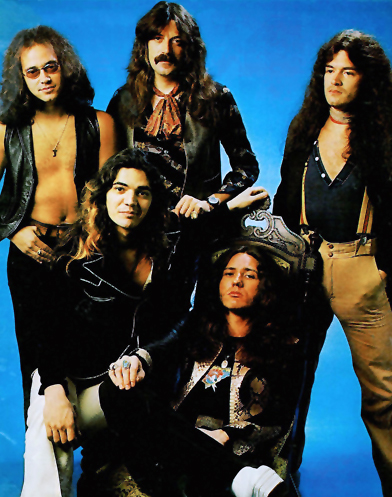
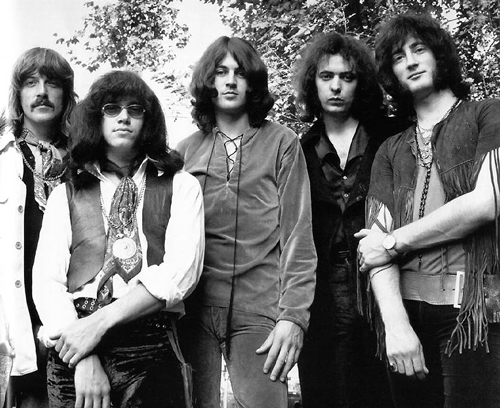
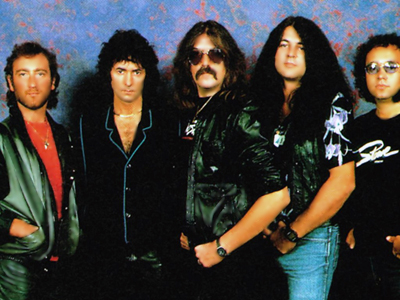
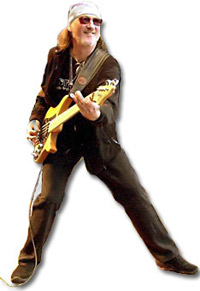 ROGER: This man always has creative tension, and it has nothing to do with whether he's American or English There is a lot of friction in this man, right from the get-go.
ROGER: This man always has creative tension, and it has nothing to do with whether he's American or English There is a lot of friction in this man, right from the get-go.